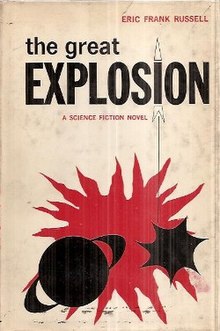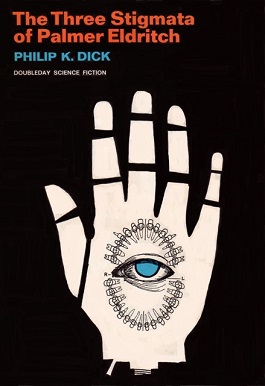
The Three Stigmata of Palmer Eldritch is a 1964 science fiction novel by American writer Philip K. Dick. It was nominated for the Nebula Award for Best Novel in 1965. Like many of Dick's novels, it utilizes an array of science fiction concepts and explores the ambiguous slippage between reality and unreality. It is one of Dick's first works to explore religious themes.

The Dispossessed is a 1974 anarchist utopian science fiction novel by American writer Ursula K. Le Guin, one of her seven Hainish Cycle novels. It is one of a small number of books to win all three Hugo, Locus and Nebula Awards for Best Novel. It achieved a degree of literary recognition unusual for science fiction due to its exploration of themes such as anarchism and revolutionary societies, capitalism, utopia, and individualism and collectivism.

Time for the Stars is a juvenile science fiction novel by American writer Robert A. Heinlein, published by Scribner's in 1956 as one of the Heinlein juveniles. The basic plot line is derived from a 1911 thought experiment in special relativity, commonly called the twin paradox, proposed by French physicist Paul Langevin.

Orphans of the Sky is a science fiction novel by American writer Robert A. Heinlein, consisting of two parts: "Universe" and its sequel, "Common Sense". The two novellas were first published together in book form in 1963. "Universe" was also published separately in 1951 as a 10¢ Dell paperback. The work presents one of the earliest fictional depictions of a generation ship.
Arthur Bertram Chandler was an Anglo-Australian merchant marine officer, sailing the world in everything from tramp steamers to troop ships, but who later turned his hand to a second career as a prolific author of pulp science fiction. He also wrote under the pseudonyms of George Whitley, Andrew Dunstan and S.H.M. Many of his short stories draw on his extensive sailing background. In 1956, he emigrated to Australia and became an Australian citizen. By 1958 he was an officer on the Sydney-Hobart route. Chandler commanded various ships in the Australian and New Zealand merchant navies, including his service as the last master of the Australian aircraft carrier HMAS Melbourne; by law, the ship was required to have an officer on board while awaiting its towing to China to be broken up. Chandler wrote over 40 novels and 200 works of short fiction, winning the Australian Ditmar Awards for the short story "The Bitter Pill" and for three novels: False Fatherland, The Bitter Pill, and The Big Black Mark. One of Chandler's daughters, Jenny Chandler, married British horror fiction writer Ramsey Campbell. His other children were Penelope Anne Chandler and Christopher John Chandler.
The concept of self-replicating spacecraft, as envisioned by mathematician John von Neumann, has been described by futurists including physicist Michio Kaku and discussed across a wide breadth of hard science fiction novels and stories. Self-replicating probes are sometimes referred to as von Neumann probes. Self-replicating spacecraft would in some ways either mimic or echo the features of living organisms or viruses.
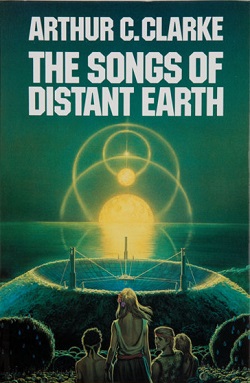
The Songs of Distant Earth is a 1986 science fiction novel by British writer Arthur C. Clarke, based upon his 1958 short story of the same title. He stated that it was his favourite of all his novels. Clarke also wrote a short step outline with the same title, published in Omni magazine and anthologized in The Sentinel in 1983.

The Darkover series is a collection of science fiction-fantasy novels and short stories written by Marion Zimmer Bradley. The series is set on the planet of Darkover, where a group of humans have been stranded and have developed their own unique culture and society. The books focus on the conflicts between the human settlers and the native population of Darkover, as well as the struggles of the various factions on the planet. The series is known for its complex world-building and exploration of themes such as gender, sexuality, and mental illness. Occasionally, Bradley collaborated with other authors, and she also edited and published Darkover stories by other authors in a series of anthologies. After Bradley's death, the series was continued, mostly by Deborah J. Ross with the permission of the Marion Zimmer Bradley Literary Works Trust.

In Death Ground is a 1997 military science fiction novel by American writer David Weber and Steve White. The story is completed in the novel The Shiva Option.
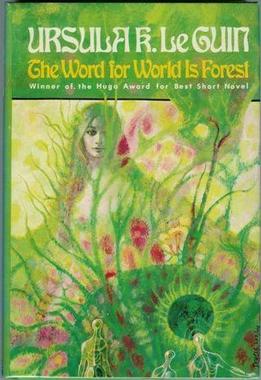
The Word for World Is Forest is a science fiction novella by American writer Ursula K. Le Guin, first published in the United States in 1972 as a part of the anthology Again, Dangerous Visions, and published as a separate book in 1976 by Berkley Books. It is part of Le Guin's Hainish Cycle.
In both science fiction and utopia/dystopian fiction, authors have made frequent use of the age-old idea of a global state and, accordingly, of world government.

The Saga of Seven Suns is a series of seven space opera novels by American writer Kevin J. Anderson, published between 2002 and 2008. The books are set in a not-too-distant future where humans have colonized a number of other planets across the galaxy, thanks in part to technological assistance from an ancient alien race, the Ildirans. The series chronicles the universe-spanning war that erupts when humans inadvertently ignite the fury of a hidden empire of elemental aliens known as the hydrogues. Internal conflict is sparked within both the human and Ildiran empires as other ancient elemental races reappear to renew their own ancient war with the hydrogues.

The Super Barbarians is a science fiction novel by British writer John Brunner, first published in the United States by Ace Books in 1962. Written in the first person, the story gives an account of an Earthman's struggle to regain lost memories and to uncover the horrifying secret of the feudal society whose people used remarkably advanced technology to conquer Earth and its solar system.
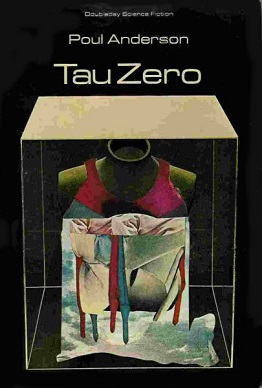
Tau Zero is a hard science fiction novel by American writer Poul Anderson. The novel was based upon the short story "To Outlive Eternity" appearing in Galaxy Science Fiction in 1967. It was first published in book form in 1970. The book is a quintessential example of "hard sci-fi", as its plot is dominated by futuristic technology grounded in real physics principles. It was nominated for the Hugo Award for Best Novel in 1971.

Cities in Flight is a four-volume series of science fiction novels and short stories by American writer James Blish, originally published between 1950 and 1962, which were first known collectively as the "Okie" novels. The series features entire cities that are able to fly through space using an anti-gravity device, the spindizzy. The stories cover roughly two thousand years, from the very near future to the end of the universe. One story, "Earthman, Come Home", won a Retro Hugo Award in 2004 for Best Novelette. Since 1970, the primary edition has been the omnibus volume first published in paperback by Avon Books. Over the years James Blish made many changes to these stories in response to points raised in letters from readers.
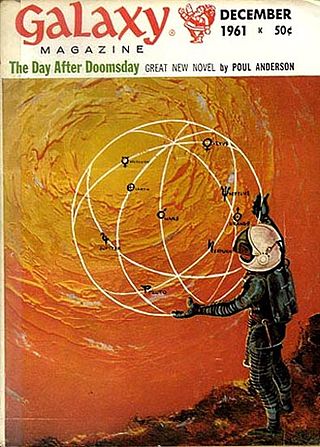
After Doomsday is a science fiction novel by American writer Poul Anderson. It was published as a complete novel in 1962, having been serialized as The Day after Doomsday in the magazine Galaxy, between December 1961 and February 1962.
The planetary systems of stars other than the Sun and the Solar System are a staple element in many works of the science fiction genre.

The Viagens Interplanetarias series is a sequence of science fiction stories by L. Sprague de Camp, begun in the late 1940s and written under the influence of contemporary space opera and sword and planet stories, particularly Edgar Rice Burroughs's Martian novels. Set in the future in the 21st and 22nd centuries, the series is named for the quasi-public Terran agency portrayed as monopolizing interstellar travel, the Brazilian-dominated Viagens Interplanetarias. It is also known as the Krishna series, as the majority of the stories belong to a sequence set on a fictional planet of that name. While de Camp started out as a science fiction writer and his early reputation was based on his short stories in the genre, the Viagens tales represent his only extended science fiction series.
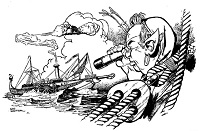
"Finished" is a science fiction short story by American writer L. Sprague de Camp, part of his Viagens Interplanetarias series. It was first published in the magazine Astounding Science Fiction in the issue for November, 1949. It first appeared in book form in the collection The Continent Makers and Other Tales of the Viagens, published in hardcover by Twayne Publishers in 1953 and in paperback by Signet Books in November, 1971.

Galactic Derelict is a science fiction novel by American writer Andre Norton, the second in her Time Traders series. It was first published in 1959, and as of 2012, had been reprinted in eight editions. It is part of Norton's Forerunner universe.
